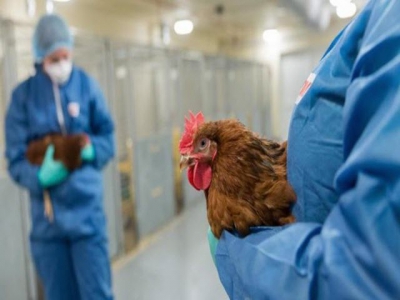New lab technique reduces need for experimental chickens
Procedure allows researchers to isolate immune cells infected by IBDV and grow them under laboratory conditions.
 5 technologies that may improve broiler welfare
5 technologies that may improve broiler welfare A Tyson Foods leader on animal welfare shared her thoughts on innovative concepts that will likely change broiler animal welfare in the near future.
 4 key factors to reduce necrotic enteritis in broilers
4 key factors to reduce necrotic enteritis in broilers Necrotic enteritis can be caused by a multitude of factors, but focusing on chick quality, diet, vaccination and bird management can mitigate risk.
 Salmonella, Campylobacter infection routes in broilers
Salmonella, Campylobacter infection routes in broilers The pathogenic bacteria can spread through a number of bodily routes and infect a large portion of the flock if unchecked.
 How Thailand is fighting poultry disease with technology
How Thailand is fighting poultry disease with technology Community engagement and a clever phone app are helping to control poultry and other livestock diseases in Thailand.
 Future of poultry welfare: What producers should expect
Future of poultry welfare: What producers should expect Attitudes to poultry welfare still vary greatly from market to market, but ever-more alignment can be expected as interest in animal welfare grows.
 Lighting may help with poultry welfare issues
Lighting may help with poultry welfare issues Industry professional discusses the impact lighting has on cannibalism, skeletal injuries and piling
 Slow-growth chicken consumer opinions can be swayed
Slow-growth chicken consumer opinions can be swayed Consumer willingness to pay more for products from slower-growing broilers depends largely on the information they receive, study reveals.
 How pie pans can help fight poultry diseases
How pie pans can help fight poultry diseases A thought exercise can help veterinarians and farmers determine the actual causes of multifactorial diseases like necrotic enteritis.
 Encouraging Hens to Lay in Nests
Encouraging Hens to Lay in Nests The occurrence of non-nest eggs (floor and slat eggs) will lead to increased labour requirements, reduced hatching egg quality and a potential reduction
 New rapid method to develop IBV vaccines for poultry
New rapid method to develop IBV vaccines for poultry Major challenge to controlling IBV is achieving protection against numerous types of the virus circulating in commercial poultry.
 Impact of dust, formaldehyde and delayed feeding after hatch
Impact of dust, formaldehyde and delayed feeding after hatch During the hatch window the early birds are exposed up to 36 hours to the hatchers environment. Depending on circumstances dust, formaldehyde
 Nuffield Scholar talks of benefits of insects for hens
Nuffield Scholar talks of benefits of insects for hens Feeding insect protein to laying hens has the potential to take off around the globe but further technical knowledge of entomology is crucial for its viability.
 Broiler breeders strive for balance in their lines
Broiler breeders strive for balance in their lines Continued evolution of the industry and consumer preference has and will undoubtedly continue to influence the shape of broiler breeder selection programs.
 The role of enzymes and lysolecithins in eubiotic nutrition
The role of enzymes and lysolecithins in eubiotic nutrition The ban on animal proteins and consequently the sole use of vegetable proteins since the year 2000, and the complete ban on antibiotic growth promoters since
 Progress on OIE Global Hen Housing Standards
Progress on OIE Global Hen Housing Standards Progress on the OIE’s Global Hen Housing outcome-based standards is taking place but may not come into force until 2019/2020.
 Keel bone damage in poultry layers explored
Keel bone damage in poultry layers explored Modern demands on the laying hen have created a “perfect storm” of conditions for generating keel bone damage, one of the leading researchers on the topic
 Poultry farm entitled to payments after bald eagle attacks
Poultry farm entitled to payments after bald eagle attacks FSA appeals division rules that White Oak Pastures is due compensation for loss and destruction of 160,000 chickens resulting in $2.2 million in losses.
 Genetic architecture of survival examined in laying hens
Genetic architecture of survival examined in laying hens Survival is an important welfare and economic trait in laying hens.
 Organic acid, essential oil blend may boost chicken efficiency, immune function
Organic acid, essential oil blend may boost chicken efficiency, immune function Supplementing poultry diets with a blend of organic acids and essential oils may improve birds' intestinal functioning and provide an alternative to antibiotic
